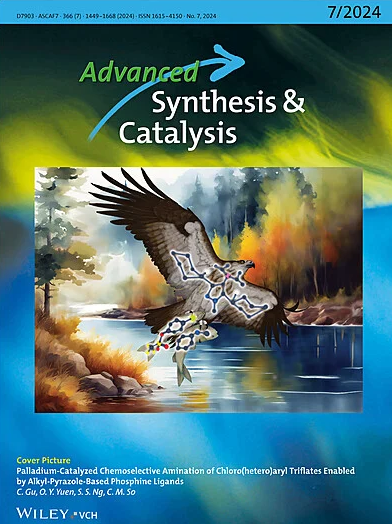Effective and Practical Stereoselective Synthesis of Nutlins Precursors by Immobilization of Privileged Chiral Mono-Amidine Catalyst
IF 4.4
2区 化学
Q2 CHEMISTRY, APPLIED
引用次数: 0
Abstract
A strategy for the immobilization of Johnston’s Mono(AMidine) catalyst (<b>MAM</b>) onto polystyrene, silica and hybrid silica-polystyrene nanoparticles is presented. The catalyst activity was evaluated in the stereoselective aza-Henry reaction leading to the pivotal β-amino nitroalkane precursors of the anti-cancer agents Nutlins (with Nutlin-3a as the most active drug). The effect of the support and the linker on the catalytic performance was investigated, observing an interesting match/mismatch effect when using a chiral linker. The polystyrene-supported 3-pyrrolidinol-linked <b>PS-(<i>S</i>)-Pyr-MAM</b> organocatalyst showed the best activity among the tested catalysts, behaving very similarly to the homogeneous counterpart in the synthesis of a library of Nutlins precursors: yield up to 95%, <i>ee</i> up to 99%, and dr up to >99:1. The catalyst recyclability was also assessed through simple filtration, yielding a satisfactory 93% <i>ee</i> after 5 cycles, showing only a moderate decrease in conversion efficiency (ca. 5% after each cycle), which resulted in an accumulated turnover number (TON) of 69.7.求助全文
约1分钟内获得全文
求助全文
来源期刊

Advanced Synthesis & Catalysis
化学-应用化学
CiteScore
9.40
自引率
7.40%
发文量
447
审稿时长
1.8 months
期刊介绍:
Advanced Synthesis & Catalysis (ASC) is the leading primary journal in organic, organometallic, and applied chemistry.
The high impact of ASC can be attributed to the unique focus of the journal, which publishes exciting new results from academic and industrial labs on efficient, practical, and environmentally friendly organic synthesis. While homogeneous, heterogeneous, organic, and enzyme catalysis are key technologies to achieve green synthesis, significant contributions to the same goal by synthesis design, reaction techniques, flow chemistry, and continuous processing, multiphase catalysis, green solvents, catalyst immobilization, and recycling, separation science, and process development are also featured in ASC. The Aims and Scope can be found in the Notice to Authors or on the first page of the table of contents in every issue.
 求助内容:
求助内容: 应助结果提醒方式:
应助结果提醒方式:


